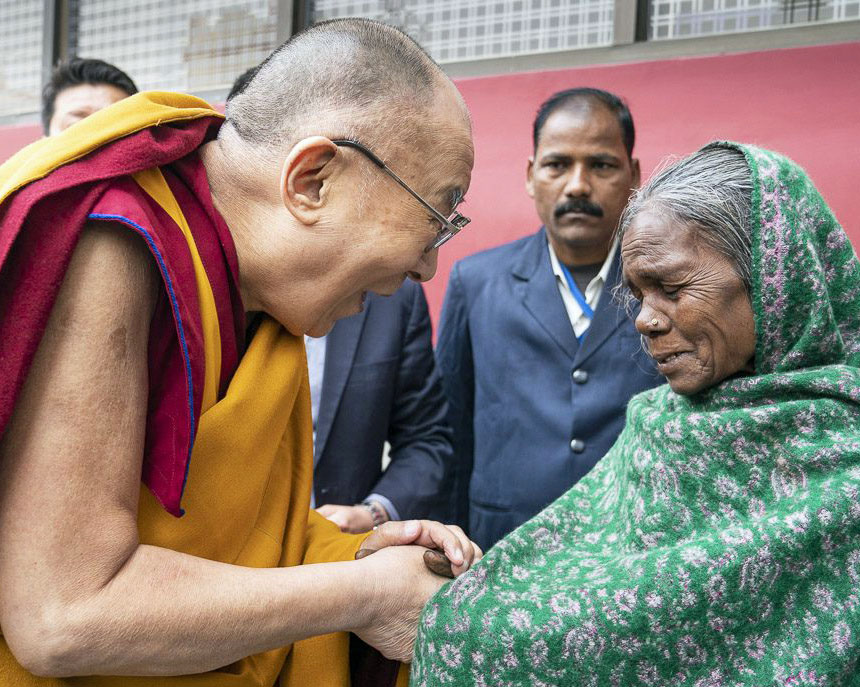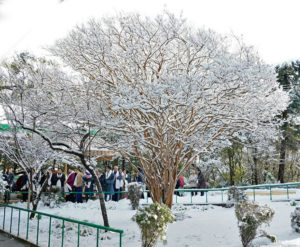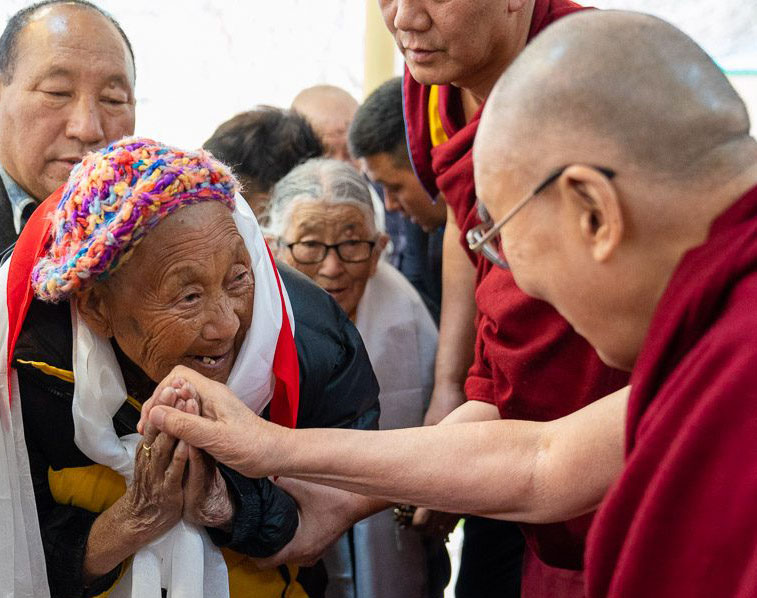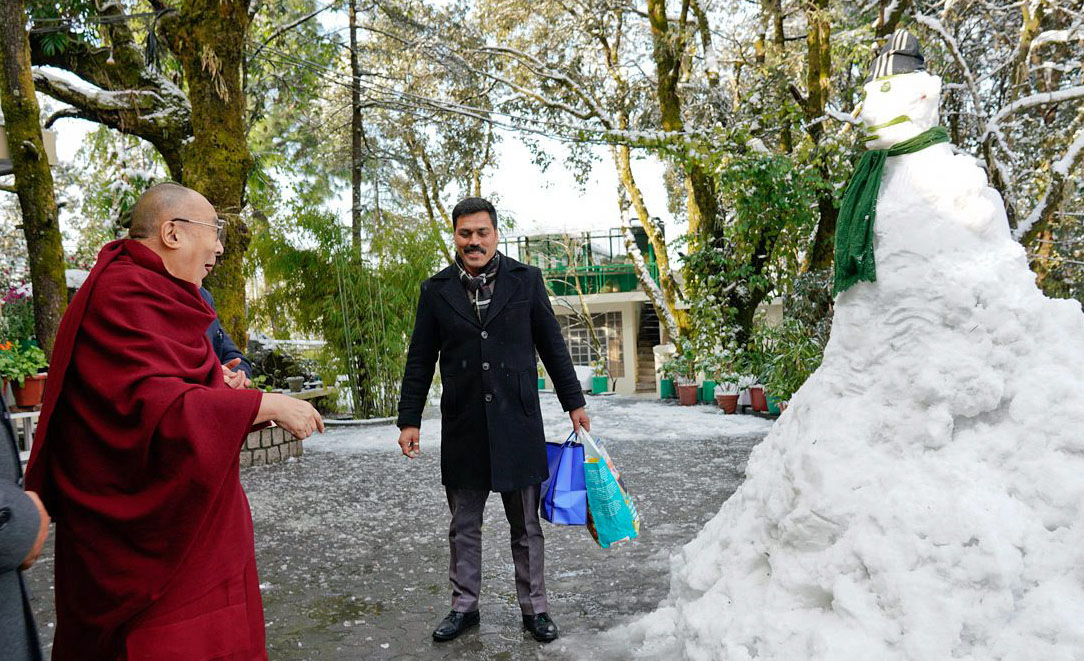Inaugurating a Conference on the Concept of ‘Maitri’ or ‘Metta’ in Buddhism in Mumbai in December 2018, The Dalai Lama emphasized the feminine as a primary source of the quality of friendliness or loving kindness.
“In my own case, it was my mother who first taught me about kindness. She sowed the seed in my mind,” said the global spiritual leader, “It is our mother who gives most of us a living example of kindness right at the start of our lives. On the other hand, the warriors of the past were almost entirely men. They are celebrated as heroes and yet they were killers. Isn’t it the case that most butchers too are men? Therefore, it’s reasonable to salute our sisters first.”
 The Dalai Lama put light on the human quality of loving kindness which, he says is often something we ignore or “take for granted”. Referring to conflict zones around the world as places of unfathomable suffering, he also pointed toward the nationalistic tendency behind such political manoevers as Brexit (the UK’s decision to leave the European Union.
The Dalai Lama put light on the human quality of loving kindness which, he says is often something we ignore or “take for granted”. Referring to conflict zones around the world as places of unfathomable suffering, he also pointed toward the nationalistic tendency behind such political manoevers as Brexit (the UK’s decision to leave the European Union.
“In some ways loving-kindness is something we take for granted, yet it’s something we need to make an effort to develop. Our level of education is highly developed, but look at the world around us. We’re at peace here, but elsewhere, at this very moment, people are being killed and innocent children are starving. Look at what’s happening in Syria and Yemen. We make too much of differences of nationality, faith, or race and neglect others’ suffering because they are ‘not like us’. In the 20th century, so much suffering took place due to violence and war, and yet we still tend to think that we can solve problems by resort to the use of force. This is not a healthy sign, but most of the people on this planet are fed up with violence. Look at how many demonstrated against the impending war in Iraq. Another example is the creation of the European Union by nations that had fought throughout history. After the horrors of the first and second world wars they concluded it was more important to protect the common interest rather than assert national sovereignty.”
“Anger is rooted in having a sense of ‘us’ and ‘them’. We need instead to respect others as members of humanity like us.”
“Coexistence takes effort, but we should work to make this century an era of peace and non-violence. We need a human approach to solving problems between us. We need to talk instead of fighting, engaging in meaningful dialogue based on mutual respect. Anger is rooted in having a sense of ‘us’ and ‘them’. We need instead to respect others as members of humanity like us. We must also aim to create a demilitarized world. To achieve external disarmament, however, requires inner disarmament. That’s where ‘maitri’, loving-kindness, comes in.”
The Dalai Lama repeated his message that the keys to a wiser future lie in the way we educate our children. He explained that modern education is oriented towards material goals, but it also needs to focus on inner values. Alongside physical hygiene, we need emotional hygiene, he said, learning to tackle our destructive emotions.
“‘Maitri’ and ‘karuna’, friendliness and compassion are essential in day to day life. We find them described in religious texts, but we can observe and develop them in an objective, secular way.”

Winter in Dharamshala
“Mothers gave birth to all 7 billion human beings alive today. They survived as a result of care and affection. As young children they did not care about nationality, faith or caste, but learned to distinguish such differences resulting in a sense of ‘us’ and ‘them’. This is how we create problems for ourselves, despite the fact that at a deeper level we are all the same in being human. ‘Maitri’ and ‘karuna’, friendliness and compassion are essential in day to day life. We find them described in religious texts, but we can observe and develop them in an objective, secular way.
“It’s easy to be kind to our relatives and friends,” His Holiness continued, “but harder towards our enemies. An enemy may appear to be hostile, but is still a human being like you. Friendly loving-kindness to an enemy is genuine loving-kindness. Similarly, unbiased compassion towards an enemy is genuine compassion. That’s what we need to train to achieve.
“Because anger and hostility destroy our peace of mind, it is they that are our real enemy. Anger ruins our health; a compassionate attitude restores it. If basic human nature were angry, there’d be no hope, but since it’s compassionate, there is. This is why cultivating inner values should be part of education. It’s also why I’m trying to revive ancient Indian knowledge of the workings of the mind and emotions. The Buddha was the product of Indian traditions like ‘ahimsa’ and ‘karuna’. We need to revive these qualities, combine them with modern education and share them with other countries in Asia.
“Since the 8th century, we Tibetans have upheld the Nalanda Tradition to which Shantarakshita introduced us. It involves study of difficult texts with an emphasis on reason and logic. My training, like that of other Tibetan monks and nuns, has involved such an immersion in the Nalanda Tradition that although I am physically Tibetan, I’m mentally Indian. Many of you may be physically Indian, but I suspect are more mentally inclined towards the West. Ancient Indian knowledge can help us cultivate peace of mind. Within that ‘maitri’ is a basic human value not just a Buddhist concept that we can come to understand objectively.”
 In the course of answering questions from the audience His Holiness discussed the decline in attention to inner values that resulted from educational institutions’ ceasing to be influenced by religion after the industrial revolution. Now, there is an urgent need to develop a more balanced, secular education that takes inner values into account. If we do that, we may see what a waste of resources it is to pour money into, for example, nuclear weapons that no one dare use. The funds would be so much better spent on health and education.
In the course of answering questions from the audience His Holiness discussed the decline in attention to inner values that resulted from educational institutions’ ceasing to be influenced by religion after the industrial revolution. Now, there is an urgent need to develop a more balanced, secular education that takes inner values into account. If we do that, we may see what a waste of resources it is to pour money into, for example, nuclear weapons that no one dare use. The funds would be so much better spent on health and education.
His Holiness stressed that we will not achieve change by prayer alone; we need to take action. In the context of physical, verbal and mental action, it’s mental action, motivation that is most effective. It takes a positive motivation to do benefit. If we take a holistic approach, free from emotional bias, our action will be more realistic.
Source: The Dalai Lama Official Website




